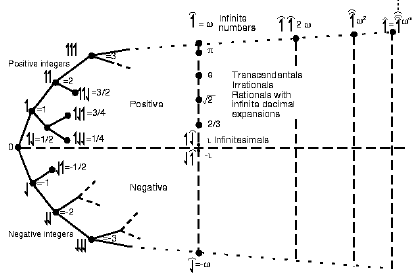This is yet another significant issue that emerges from the ongoing exchanges on subjectivity, objectivity, possibility of objective moral truth, etc. And, the deep interconnectedness of what we are discussing is proving quite fruitful.
So, I think it is useful to now headline Bob’s remark in the rebooting ethics education thread, which ties in Mathematics. And those who find it hard to follow use of indented text blocks to quote, please pardon that praxis:
BO’H, 25 :>>but aren’t the axioms that mathematicians assume subjective? (they may be rational, but they’re not the only possible axioms that could be used) What follows after that is (or at least should be!) objective, of course.>>
My response is:
KF, 26: >>No. Instantly, an axiomatic framework is an element of a modelling exercise that is open to discussion, argument, warrant and required coherence with an existing body of established knowledge.

Coherence of the system is a major constraint on whims and fancies [which is where something would become subjective, captive to a subject’s imagination], and is tied to our rich, deep and widely accessible experience of structure, quantity and linked reasoning. So, for instance, the main structure of mathematics, numbers, emerges from the world-framing fact of distinct identity so that a world
W = {A|~A},
thence two-ness and what flows from that.
Such issues are so deeply embedded that we tend to overlook their significance.
I think I also need to point out that objectivity is not synonymous with either infallibility or absolute truth. Something is infallibly true where it is beyond possibility of error, typically due to some form or other of self-evident undeniability, e.g. that
||| + || –> |||||
which we may symbolise as
3 + 2 = 5.
Absolute truth is the whole, untainted, undiluted correct description of a matter in hand: truth, the whole relevant truth, nothing but the truth. (Hence the famous court room oath.)
By contrast, objective truth is about the degree of truth that is externally accessible (i.e. in principle available to “anyone”) and is so warranted as credible (thus, reliable) that it is is worthy of belief and willingness to act i/l/o the degree of warrant. It is fallible, but a responsible party aware of its warrant should act on it with confidence. (And yes, this all brims over with the inextricably entangled, intertwined hand-in-hand links between the IS and the OUGHT. That is in part why it is so important that we bridge IS and OUGHT at world-root level.)
Knowledge is of course our normal term for warranted credibly true and reliable belief; as “belief” implies it is clearly held by subjects who come to believe. And likewise the warranting process is an active process created by subjects and evaluated by subjects. Subjectivity is inevitable in knowledge but that obviously does not lock out the objective nature of well warranted truth claims. Nor does it reduce knowledge to subjectivism.
Likewise, abstracta are not parts of the world of the direct senses, they are inferred, conceptualised, reflected on. But that does not make them subjective in the relevant sense, i.e. lacking in objective warrant and locked into some individual subject’s perceptions, potential for error, bias, gaps etc. The possibility and actuality of cross checking greatly enhances reliability.
Perhaps a simple exercise similar to Babbage in the ninth Bridgewater Thesis will help.
Suppose subject s1 believes some claim c is true on some point of warrant w that is accessible to other subjects in a relevant community, s1 to sn. Now, w has a probability of error in the case of an individual subject sj, say 0.001. Obviously, providing the odds of error are independent and stable, the cumulative odds of the entire community being in error run like e^n. For n = 3, E_3 = [10^-3]^3 = 10^-9 already. For n = 11, E-11 = 10^-33, and for n = 500, E_500 = 10^-1500. Reliability rises very quickly indeed with multiple independent witnesses with fairly reliable means of warrant. [Of course, with error-prone subjects, the odds of SOMEBODY in the chain/community being wrong also rise with the number. Odds that no-one is in error run like (1 -e)^n, which exponentially falls toward zero.]
Where also, the low likelihood of error in the process itself creates a pattern where a super-majority already will most likely be correct. And of course if the process of warrant is itself accessible to independent cross-checking, odds of overall and consistent error in warrant and/or in conclusion will fall.
Of course, if the community is so interconnected that they reduce to being in effect a single observer, the odds rise back to e. This leads to the significance of multiple, independent lines of warrant w1 to wk that converge on the same verdict: coherence is exponentially mutually reinforcing in squeezing out the likelihood of error. Classically, in the mouth of two or three [independent] witnesses shall a word be established.
Such of course highlights the potential and dangers of a peer-review system, as if the system becomes captive to a common, enforced ideology, its reliability falls drastically due to reducing from multiple, mutually reinforcing lines of convergent warrant to being a single line of claimed warrant.
Nor, does the possibility of multiple options in axioms change the matter of objectivity.
As can be seen with classical Euclidean Geometry, multiple alternative axioms are possible but functionally equivalent (esp. relative to the parallel lines axiom). And where significantly diverse axioms are possible, their effect is to materially change the subject, here, from a Euclidean space to an elliptical or spherical or hyperbolic one, etc. And always, coherence is treasured across domains, so that the system of the logic of structure and quantity is in its heart mutually and freely accessible and reinforcing.
Action of subjects does not automatically force subjectivity of truth claims resulting from such actions, once we have externally accessible warrant and for preference independent, converging lines of mutually reinforcing evidence and argument.
Using the analogy of a spider’s spiral web, the central parts may not be directly accessible to external anchor-points, but they function to tie the whole together through providing a node that unifies the external anchor points, with the spiral web providing a common path from any point to any other.>>
Again, food for thought, especially on the importance and value of diverse schools of thought/paradigms in an intellectual or decision-making community.
Consensus is valuable but there can be such a reality as too much of a good thing. END
PS: A sketch map of the surreals, embracing numbers great and small:
PPS: Collins English Dictionary is helpful:
subjective
adj
1. belonging to, proceeding from, or relating to the mind of the thinking subject and not the nature of the object being considered
2. of, relating to, or emanating from a person’s emotions, prejudices, etc: subjective views.objective
adj
1. (Philosophy) existing independently of perception or an individual’s conceptions: are there objective moral values?.
2. undistorted by emotion or personal bias
